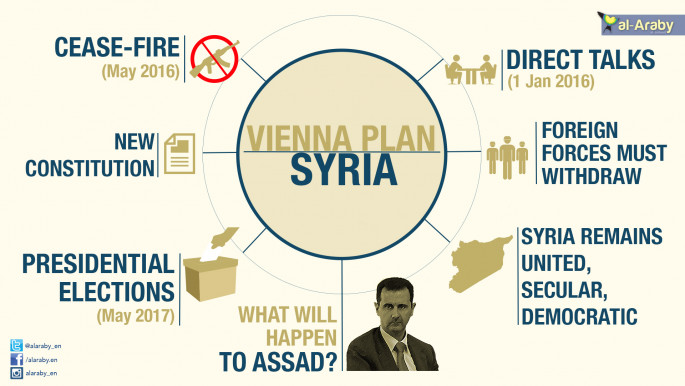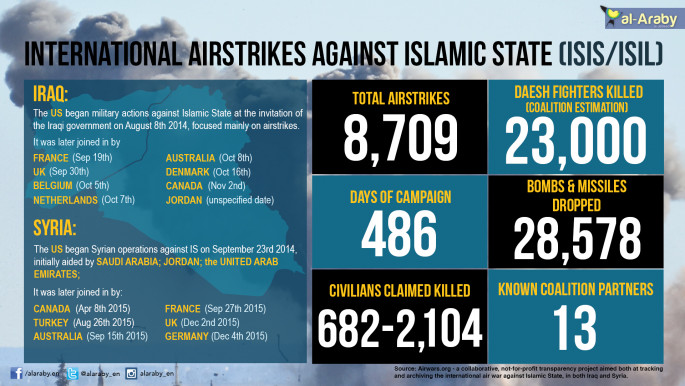World powers to decide Syria's fate in New York
Russia's recent military intervention in Syria appears to be giving it political leverage as world powers meet to negotiate on Syria's future.
4 min read
Russia's recent military intervention appears to be providing leverage [AFP]
Nations gathering for a United Nations meeting on Friday will decide the fate of Syria, with plans for negotiations and transition being led by Russia.
The two main sides - led by the United States and Russia - are split on two key issues: the fate of President Bashar al-Assad and which rebels groups are moderate, and which are "terrorists".
Russia's recent military intervention in Syria has put President Vladimir Putin in the driving seat.
US President Barack Obama has said that rebels who join the process could enjoy "pockets of cease-fire" where they no longer face Syrian or Russian bombs.
The implication was that those who refuse could still be targeted.
This is a massive departure from the US vocal support for the rebels and demands that President Bashar al-Assad should handover power immediately before the Islamic State group's influence increased in the east.
Iran's foreign minister - a strong backer of the Syrian regime throughout the conflict - said that there "seems to be no agreement" on two key issues just hours before the latest international conference on Syria is held.
Mohammad Javad Zarif told the Associated Press on Thursday that his country had seen "no lists we can agree upon" about which Syrian opposition groups will take part in 1 January talks between rebel and regime officials.
"Card-carrying members of al-Qaeda do not satisfy the conditions that we set for members of the opposition," Zarif told reporters.
He ruled out any affiliates of the extremist group. "The opposition should be serious, and it should be inclusive."
Russia's ambassador to the UN told reporters that he sees attempts to "undercut" the communiques that have been agreed upon in the Syria discussions so far. Ambassador Vitaly Churkin didn't give details.
A peace plan agreed to last month by 20 nations meeting in Vienna sets a 1 January deadline for the start of negotiations between Assad's regime and opposition groups.
The plan says nothing about Assad's future but says that "free and fair elections would be held pursuant to the new constitution within 18 months".
In any event, diplomats say the chances for ending the conflict between Assad's military and moderate rebel forces are better now than they've been for a long while.
All speak of seizing the momentum of several ground-breaking meetings in recent months.
For the first time, the rise of the Islamic State group (IS) has the US, Russia and even sworn enemies such as Saudi Arabia and Iran committed to a blueprint for peace talks.
These are expected to be endorsed by the UN Security Council on Friday, following meetings among foreign ministers in New York.
The opposition's 34-member delegation will be headed by former Syrian prime minister Riyad Hijab who had defected from the regime.
National Coalition for Syrian Revolutionary and Opposition Forces member Nasr al-Hariri told al-Araby al-Jadeed that the opposition feels that the US and Russia have reached a consensus over Syria.
He is expecting the UN Security Council to reach an agreement by which a ceasefire would be implemented to go in parallel with the peace process.
This would specify confidence-building procedures such as breaking sieges, delivering humanitarian aid, stopping barrel bombs and freeing detainees.
Jordan is close to completing a list of militant groups that could join a unity government, and which, like IS and al-Qaeda, would be declared terrorists and enemies of all.
Still, "very real" gaps remain, Samantha Power, the US ambassador to the United Nations, told reporters this week.
For one, the Russian division of "terrorist" v legitimate rebel forces differs significantly from that of US and Arab governments, diplomats say. And no agreement can be reached if Russia isn't satisfied.
Washington now looks desperate to secure a guarantee that Assad will eventually leave office in a transition, having abandoned Obama's previous demand that the Syrian leader step down immediately.
Matthew Rycroft, Britain's UN ambassador, said these issues and the mechanics of a cease-fire will all be on the table on Friday.
A Security Council resolution on the Syrian peace process, he said, would be a "very rare showing of unity" for world powers.
US Secretary of State John Kerry appears interested in securing a broad peace that would allow the world to concentrate on defeating IS militants.
The shared commitment against IS has governments believing they can sidestep their disagreements on Assad and other matters to end the killing.
The US has a lot riding on engineering a cease-fire and jumpstarting Syria's transition.
Obama, who has ruled out any significant deployment of US ground forces, has failed to build a US-trained, Arab fighting force to defeat IS.
While Kurdish Peshmerga and Arab militants have fought effectively, no one sees their numbers or strength as sufficient to achieve the mission.
The US may have greater luck if peace between Syria's government and mainstream rebel groups holds.
They hope each would then cooperate and turn their guns on IS, with regional powers such as Saudi Arabia filling the remaining needs for a ground force.
It's unclear if everyone would be on board, or if Russia would view such developments in its interests.
The two main sides - led by the United States and Russia - are split on two key issues: the fate of President Bashar al-Assad and which rebels groups are moderate, and which are "terrorists".
Russia's recent military intervention in Syria has put President Vladimir Putin in the driving seat.
US President Barack Obama has said that rebels who join the process could enjoy "pockets of cease-fire" where they no longer face Syrian or Russian bombs.
The implication was that those who refuse could still be targeted.
This is a massive departure from the US vocal support for the rebels and demands that President Bashar al-Assad should handover power immediately before the Islamic State group's influence increased in the east.
Iran's foreign minister - a strong backer of the Syrian regime throughout the conflict - said that there "seems to be no agreement" on two key issues just hours before the latest international conference on Syria is held.
Mohammad Javad Zarif told the Associated Press on Thursday that his country had seen "no lists we can agree upon" about which Syrian opposition groups will take part in 1 January talks between rebel and regime officials.
"Card-carrying members of al-Qaeda do not satisfy the conditions that we set for members of the opposition," Zarif told reporters.
He ruled out any affiliates of the extremist group. "The opposition should be serious, and it should be inclusive."
Russia's ambassador to the UN told reporters that he sees attempts to "undercut" the communiques that have been agreed upon in the Syria discussions so far. Ambassador Vitaly Churkin didn't give details.
| Card-carrying members of al-Qaeda do not satisfy the conditions that we set for members of the opposition - Iran's Foreign Minister Mohamamd Jawad Zarif |
A peace plan agreed to last month by 20 nations meeting in Vienna sets a 1 January deadline for the start of negotiations between Assad's regime and opposition groups.
The plan says nothing about Assad's future but says that "free and fair elections would be held pursuant to the new constitution within 18 months".
In any event, diplomats say the chances for ending the conflict between Assad's military and moderate rebel forces are better now than they've been for a long while.
All speak of seizing the momentum of several ground-breaking meetings in recent months.
For the first time, the rise of the Islamic State group (IS) has the US, Russia and even sworn enemies such as Saudi Arabia and Iran committed to a blueprint for peace talks.
These are expected to be endorsed by the UN Security Council on Friday, following meetings among foreign ministers in New York.
The opposition's 34-member delegation will be headed by former Syrian prime minister Riyad Hijab who had defected from the regime.
National Coalition for Syrian Revolutionary and Opposition Forces member Nasr al-Hariri told al-Araby al-Jadeed that the opposition feels that the US and Russia have reached a consensus over Syria.
He is expecting the UN Security Council to reach an agreement by which a ceasefire would be implemented to go in parallel with the peace process.
This would specify confidence-building procedures such as breaking sieges, delivering humanitarian aid, stopping barrel bombs and freeing detainees.
 |
Jordan is close to completing a list of militant groups that could join a unity government, and which, like IS and al-Qaeda, would be declared terrorists and enemies of all.
Still, "very real" gaps remain, Samantha Power, the US ambassador to the United Nations, told reporters this week.
For one, the Russian division of "terrorist" v legitimate rebel forces differs significantly from that of US and Arab governments, diplomats say. And no agreement can be reached if Russia isn't satisfied.
Washington now looks desperate to secure a guarantee that Assad will eventually leave office in a transition, having abandoned Obama's previous demand that the Syrian leader step down immediately.
Matthew Rycroft, Britain's UN ambassador, said these issues and the mechanics of a cease-fire will all be on the table on Friday.
 |
| [click to enlarge] |
A Security Council resolution on the Syrian peace process, he said, would be a "very rare showing of unity" for world powers.
US Secretary of State John Kerry appears interested in securing a broad peace that would allow the world to concentrate on defeating IS militants.
The shared commitment against IS has governments believing they can sidestep their disagreements on Assad and other matters to end the killing.
The US has a lot riding on engineering a cease-fire and jumpstarting Syria's transition.
Obama, who has ruled out any significant deployment of US ground forces, has failed to build a US-trained, Arab fighting force to defeat IS.
While Kurdish Peshmerga and Arab militants have fought effectively, no one sees their numbers or strength as sufficient to achieve the mission.
The US may have greater luck if peace between Syria's government and mainstream rebel groups holds.
They hope each would then cooperate and turn their guns on IS, with regional powers such as Saudi Arabia filling the remaining needs for a ground force.
It's unclear if everyone would be on board, or if Russia would view such developments in its interests.
[Agencies contributed to this report]





 Follow the Middle East's top stories in English at The New Arab on Google News
Follow the Middle East's top stories in English at The New Arab on Google News


